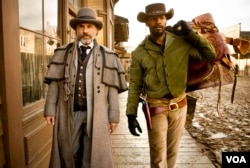Today's post comes to us from Simbarashe Runyowa, an Oberlin student from Zimbabwe. The topic is a delicate one - racism that Simbarashe encounters here in the U.S., and in his home nation. Throughout, he refers to "the n-word." For those unfamiliar, there's a racist slur beginning the the letter "n" used to refer to people of African descent that's so offensive in the U.S., it's almost exclusively referred to as "the n-word." Of course, as with many things, it's slightly more complicated than that, as the full word is sometimes used in popular music, or even on occasion between African-Americans themselves. That said, it remains so offensive a term that we'll just use "the n-word" reference.
Not too long ago, I went to watch Quentin Tarantino's latest movie Django Unchained. I was deeply curious about it because before the film even came out, some black intellectuals had sharply criticized it for being racist. His main criticism of Djangowas that the film all too liberally and uncritically deployed the "N" word (it is repeated over 100 times in the film), and that, for this reason, the film was an assault on the history of black people in America.I went to watch Django to make my own judgments. As expected of any film by Tarantino, it was replete with egregious violence. In one particularly gruesome scene, Leonardo DiCaprio's character sets dogs on a slave as punishment for having failed to secure a convincing victory in a Mandingo fight. [The slave is mauled to death.] In another scene, a plantation owner unleashes violent lashes onto a slave woman's back for the trivial crime of breaking a couple of eggs.
The "n-word" is littered throughout the film; both whites and blacks dispatch it, slaves and their owners alike utter it. Tarantino obviously felt that artistic license gave him the legitimacy to throw around a word that is so wholly repulsive. It got me to thinking - why were black intellectuals so enraged with Tarantino? Is it ever permissible for these and other dis-empowering words to be circulated in society? And why does this word continue to be hurtful?
A couple of weeks ago*, Oberlin College made international headlines for all the wrong reasons. There was a string of incidents in which someone was writing racist slurs all over campus. Most of the time, it was the N word. There was KKK paraphernalia being left all over campus. The final straw was when a person wearing what appeared to be a KKK garb was spotted lingering near African Heritage House, a space where a good number of African and African-American students lived. It all seemed so surreal—the Ku Klux Klan, the "n-word"—these were things I had never expected to encounter in my life.
The day after the sighting of the clan member, students lobbied the administration to cancel class for the day, and we had what was called the Day of Solidarity. Instead of class, we had a teach-in, convocation and marches. It was a powerful show of solidarity in the face of an extremely depressing and painful experience.
I remember as the events unfolded feeling a profound sense of sadness at the fact that racism so blatant was continuing to be perpetuated in this day and age at what is undoubtedly one of America’s most liberal colleges. In that moment, I sympathized with the rage the critics of Django had felt towards the "n-word."
My English professor often says that no statement that is made is ever neutral—everything is imbued with ideology, a message, a worldview. Racist graffiti is not merely writing on a wall, but a commentary - in this case, a negative and dis-empowering commentary on black people.
Words in and of themselves are loaded with power—they can be used to uplift or degrade, to lift up or to tear down. The thing about the "n-word" is that when it is thrust in your face, it takes on a whole new significance. Unlike in Tarantino's Django, the perpetrators of the word are not far removed fictional characters in a 2-hour-long movie, but real people in the community in which you live. You realize, someone out there sees no value in diversity, no value in you or your existence, no value in your right to be in a place like Oberlin.
Coming to the US, my engagement with the notion of race changed dramatically because I immediately became a minority (versus back home when I fall in the majority.) The nuances of race relations in the US are different, and are informed by a different history. In Zimbabwe, the extent of racism I had experienced was mostly in the form of micro-aggressions, whereas this racism in America was blatant. The effects of both forms of were however nearly the same. The power of racism is in its ability to strip a person of both power and dignity. Seeing the "n-word" scrawled in my college’s hallways made me feel alienated and stripped of power—unwelcome, unworthy and unwanted.
I was naïve in coming to the United States thinking that I would be sheltered from the vices of racism. I felt even more confident of that given that I had chosen to attend what is arguably America’s most liberal college. But even here in this progressive enclosure of liberalism, racism and other forms of oppression continue to fester. America’s concept of a post-racial society is in many ways a utopian concept that is far from materializing. I realized, with dejection, that the racist world Tarantino portrays, which at first seemed like a fictional and obsolete concept, is not that far removed from contemporary society.
To be sure, oppression in its many forms exists everywhere in the world. It is a function of the societies we live in, of history, of privilege and the lack of it. What I love about America is that it aspires to erase these forms of oppression. It’s far from perfect, but it is on its way. In that sense, despite my disappointment with the events that occurred at my college, I still feel glad to live in a society that, despite being flawed, is still striving. And striving is perhaps the only sure way we will make progress towards a better society.
*This post was written earlier this year, but never published.





